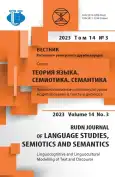Lexico-Semantic Group of Verbs of Interpersonal Relations in Russian and Chinese: based on the Translation of F.M. Dostoevsky’s Novel “Crime and Punishment”
- Authors: Li X.1, Rybinok E.S.1
-
Affiliations:
- RUDN University
- Issue: Vol 14, No 3 (2023): LINGUOCOGNITIVE AND LINGUOCULTURAL MODELLING OF TEXT AND DISCOURSE
- Pages: 960-975
- Section: SEMANTICS AND SEMIOTICS
- URL: https://journal-vniispk.ru/2313-2299/article/view/323428
- DOI: https://doi.org/10.22363/2313-2299-2023-14-3-960-975
- EDN: https://elibrary.ru/IVLUNG
- ID: 323428
Cite item
Full Text
Abstract
This study is devoted to the analysis of lexico-semantic group of verbs, which express attitude to someone in Russian and the ways of their translation into Chinese. A group of emotional and evaluative verbs included in the lexico-semantic field of interpersonal relations is analyzed. The choice of the study material is determined by the fact that this group of verbs is one of the most frequent in the use and widely represented in the novel “Crime and punishment” by F.M. Dostoyevsky, occurring 561 times. The significance of this research lies in the absence of a special systematic study of this lexico-semantic group on the material of literature in Russian and Chinese languages, as well as in the need to develop a comprehensive research methodology, methods of comparative and contextual analyses. The study reveals the semantic features of verbs in the Russian and Chinese languages. It is established that the lexico-semantic group under study consists of verbs that are perceived as categorical-lexical semes “relation” and can have both positive and negative semantic meaning. The semes ‘positive attitude’, ‘love’, ‘faith’, ‘respect’, ‘compassion’, ‘pity’ and ‘negative attitude’, ‘suffering’, ‘doubt’, ‘fear’ are subjected to study. These features determine the structure of the group in question in the lexical and semantic system of the Russian and Chinese languages, are expanding the understanding of the content and structure of the group of verbs. The result of the study is that the analysis of interlingual gaps reveals the presence of incomplete lexical correspondence to a foreign language word. The analyzed linguistic material made it possible to identify similarities and differences in the semantics of verbs when translating the text of the novel into Chinese.
About the authors
Xiuyu Li
RUDN University
Author for correspondence.
Email: lixiuyu0525@yandex.ru
ORCID iD: 0009-0004-8283-534X
postgraduate student of the Department of General and Russian Linguistics, Faculty of Philology
6, Miklukho-Maklaya Str, Moscow, Russian Federation, 117198Evgeny S. Rybinok
RUDN University
Email: rybinok-es@rudn.ru
ORCID iD: 0000-0001-8761-5304
ResearcherId: AAC-9021-2022
PhD in Philology, Senior Lecturer at the Department of General and Russian Linguistics, Faculty of Philology
6, Miklukho-Maklaya Str, Moscow, Russian Federation, 117198References
- Novikov, L.A. (2001). Selected works. Vol. 1. Problems of linguistic meaning. Moscow: RUDN publ. (In Russ.).
- Vinogradov, V.V. (1977). Selected works. Lexicology and lexicography. Moscow: Nauka. (In Russ.).
- Apresjan, Y.D. (1963). Modern methods of studying meanings and some problems of structural linguistics. In: Problems of structural Linguistics. Moscow: USSR Academy of Sciences publ. pp. 102-150. (In Russ.).
- Denisenko, V.N. (2014). Method of field in lexical semantics. Moscow: RUDN publ. (In Russ.).
- Wu, Zhe. (1998). The hierarchical structure of the lexical-semantic system and the status of lexico-semantic group. The journal of Heilongjiang Universiy, 1, 33-36. (In Chinese).
- Ma, Weiqun. (1984). A brief explanation of lexico-semantic group. Teaching Russian in China, 1, 44-45. (In Chinese).
- Denisenko, V.N. (2006). Semantic field theory: texts, questions, comments. Moscow: RUDN publ. (In Russ.).
- Shvedova, A.Y. (1995). The verb as a dominant of the Russian lexicon. In: Philological collection. To the 100th anniversary of the birth of Academician. V.V. Vinogradov. Moscow: Vinogradov Russian Language Institute of the Russian Academy of Sciences publ. (In Russ.).
- Fakharova, G.R. (2011). Functions of verbs of interpersonal relations in the language of works by I.A. Bunin. Perm University Herald, 2, 111-116. (In Russ.).
- Gaisina, M.R. (1981). Lexico-semantic field of verbs of attitude in modern Russian. Saratov: Saratov State University publ. (In Russ.).
- Vasilyev, L.M. (1981). Semantics of the Russian verb. Moscow: HS Publ. House. (In Russ.).
- Rumyantseva, M.V. (1997). Semantics and functions of verb predictions of interpersonal relations in the modern Russian language. Saint Petersburg: St. Petersburg University publ. (In Russ.).
- Akimova, T.P. (2018). Communicative-pragmatic features of verbs of interpersonal relations. Volgograd: Volgograd State Pedagogical University publ. (In Russ.).
- Dostoevsky, F.M. (1866). Crime and punishment. Leningrad: Nauka. (In Russ.).
- Crime and Punishment. Transl. into English. [Электронный ресурс]. URL: https://liteka.ru/english/library/631-crime-and-punishment#3 (accessed: 08.07.2023).
- Yue, Haoping & Fan, Xing. (2023). The influence of cultural differences on literary translation and the choice of translation strategies. Overseas English, 7, 217-219. (In Chinese).
- Wang, Junya. (2023). Research of natural language processing based on dynamic search corpus in cultural translation and emotional analysis. URL: https://portal.sclib.org/interlibSSO/goto/11/+jmr9bmjh9mds/kns8/defaultresult/index (accessed: 08.07.2023).
- Dong, Junfei. (2020). Semantic features of emotive verbs in Russian and Chinese. The journal Vestnik Berdyansk State Pedagogical University. Series, 1. Pedagogy. Psychology. Philology, 4, 94-97. (In Russ.).
- Dostoevsky, F.M. (2019). Crime and punishment. Zeng, Siyi (Transl.). Zhejiang: Zhejiang Literature & Art Publishing House. (In Chinese).
- Dostoevsky, F.M. (2015). Crime and punishment. Yue, Lin. (Transl.). Shanghai: Shanghai Translation Publishing House. (In Chinese).
- Babenko, L.G. (1999). Explanatory Dictionary of Russian Verbs. Ideographic description. English equivalents. Synonyms. Antonyms. Moscow. (In Russ.).
- Aleksandrova, Z.E. (1986). Dictionary of synonyms of Russian language. Moscow. (In Russ.).
- Dictionary of antonyms of the Russian language. URL: https://antonymonline.ru. (accessed: 19.01.2023). (In Russ.).
- Dictionary of Chinese-Russian. URL: https://www.zhonga.ru (accessed: 23.06.2023).
- Zhang, Jianhua & Zhao, Wenyan. (2021). Modern Russian-Chinese Dictionary. Beijing.
- Liu, Shuxiang & Ding, Shengshu. (2016). Modern Chinese Dictionary. Beijing.
Supplementary files









